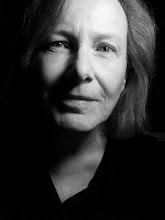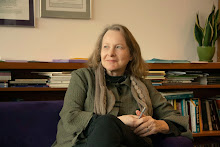
While Ellipticism has been applied to a poetic style or school, it seems to me that the idea of what's missing, and how that perpetrates the creative act (both in composition and interpretation), is everywhere. In a restaurant, overhearing only bits of a conversation and filling in the rest; in a face to face conversation where gesture and facial expression fill in the unspoken text, perhaps with contradictions to, or support for, the actual words spoken; at the movies, where cinematic jump cuts and flashbacks elide the linearity of a plot; or through background music that supports, denies, or introduces an entirely other world--all add another dimension to the spoken word. This is also true in drama (and maybe a better comparison than film, since dialogue in drama is of utmost importance) where playwrights get to use all the surrounding apparatus of dialogue (action, gesture, prop, music, costume,
scenery) to emphasize, confound, or subvert the spoken word. Having begun my writing life writing plays, not poems, I am always interested in the correspondences between and among these two forms, especially in re: to the idea of "meaning." In theater, the concept of the fourth wall is a great one to apply to the poem wherein the reader can “peer into” the world of the poem with the sense of overhearing something meant to be private. Just as in a play, where the audience is not overtly included (except occasionally, by design), but whose presence is crucial to the creator, a poem needs to be "looked at" in order to exist at all. For the playwright, as for the poet, the audience determines effect. When Arthur Miller built a small cabin in the woods in order to write in isolation the play that was hounding him (Death of a Salesman) he still had no idea that this play that had a hold on him would have a hold on an audience. On opening night, as he stood in the back of the theater and watched the curtain come down in complete silence, then stood for a moment as no one moved or spoke he thought: "It's a failure" until, as the story goes, someone remembered to applaud and "the whole house came down."
In a recent New Yorker article (Dec.23, 2007), John Lahr quotes Harold Pinter: "I think there’s a shared common ground [among people] all right, but that it’s more like quicksand." Pinter's plays, of course, depend on the elliptical moments, those pauses fraught with multiple meaning, looks and intonations, all the missing words among the characters and what's not said is most powerful. Perhaps such power is hard to achieve on the page--certainly the poetic "leap" that Bly proposed as existing and reproducible is one way to put the fraught back into the pause for a poet. Unfortunately, many contemporary poets have only the empty pause--much like the dreaded "dead air" on a radio program--to show for their elliptical efforts.
By the way, I wonder what ever happened to "verse drama"--is there anything in contemporary poetry that would fit that description? Maybe Gluck’s Meadowlands? I think the Poetry Foundation is trying to revive the form with an award for such.




No comments:
Post a Comment